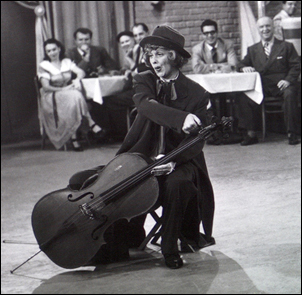I've been posting about reality and illusion, using the music of J. S. Bach as my starting point, and my experiences playing Bach's cello suites as the backbone of the discussion. And I've been trying to ask a strange question. Do the Six Suites for Solo Cello exist? Does Bach himself exist?
I think all is illusion—or, rather, our subjective approach to Bach and to anything else "is" the reality. Bach’s Suites don’t exist as an absolute quantity or quality, as something forever unchanging, as something that all observers can agree upon with any degree of certainty. Like the quantum physicists who believe that the physical world doesn’t exist outside your perception of it, I believe that Bach’s Suites don’t exist outside what you make them to be—in your mind, your ears, your cello or marimba playing, your emotions, your thoughts, your family history, and everything else that forms the entity known as “you.” (BTW, quantum physicists believe that you don’t exist either, or me, or anyone or anything else. But this isn’t pertinent to this discussion.)
It is, however, exceedingly easy to fall prey to the illusion of the Suites’ reality, and to conduct your life as if they were, indeed, real.
If you believe that the Suites exist, you practice the cello in a certain way. You think long and hard about historicity, Bach’s intentions, the acoustic properties of the Baroque cello (or the viola da spalla or the violoncello da span or the . . .) and the environment where the Suites were originally performed, the manuscripts by Bach’s wife and students, what the scholars think, what the musicologists think, and a thousand other considerations.
If you believe that they’re illusory, you practice in a whole other way. You may or may not pay attention to the musicological issues. You may or may not try to find out how the Baroque cello (or the viola da spalla or the . . .) sounded like. You may or may not compare different editions. You may or may not listen to the highly regarded scholar-performers who give period-instrument performances. You may or may not listen to Casals, Ma, Rostropovich, or anyone else.
One attitude says, “You can’t start that Sarabande on an up-bow. Nobody would have done it in Bach’s time.” The other says, “How would it sound like if you started that Sarabande on an up-bow?”
One attitude says, “Certain things are nonnegotiable.” The other says, “Everything is possible.”
There are merits and demerits to both approaches. Some disciplined musicians have given a lot of thought to historical, acoustic, and aesthetic issues; shaped their techniques to follow unyielding strictures; and given marvelous performances as a result. Others who have thought many of these lofty thoughts have given terrible performances. I once attended a concert by a star pioneer of the period-instrument movement. I left in the intermission, regretting the time and money wasted. Same with the everything-is-possible crowd. Thirty-five years ago I heard an unforgettable performance of the Third Suite on the marimba, played with divine beauty by a young man at a street fair in New York City. And I’ve heard plenty of performers unconstrained by taste, technique, or any degree of self-awareness do unspeakable things to Bach.
What does it all mean, in practice? What is a musician to do with all this metaphysical information?
The reason why András Schiff got me thinking is that some people think the music of J. S. Bach shouldn’t be played on the modern piano. It wasn’t “meant” to be played on the piano. It was “meant” to be played on the clavichord, a lovely plinky-plink instrument known to have been a favorite of Bach’s. According to this view, the mechanisms of the piano are in antagonism with the notes, phrases, and musical structures as conceived by Bach, and it’s a musical, sonic, aesthetic, historical mistake to play Bach on the piano.
Well, I think Bach’s keyboard music, much like the cello suites, doesn’t exist as an absolute entity. What exists is the inevitable, necessary, deeply personal, all-too-human interaction between the player and a vaguely delineated object called “the score.”
The interaction between the score and the player is subjective, and so is the interaction between the listener and the entity now known as the-interaction-between-the-music-and-the player. I hear András Schiff do his subjective thing, and I have a subjective reaction of pleasure, even of love. It’s a love triangle: Bach, Schiff, and Alcantara, united in a single, continuous experience. Bach passed away centuries ago, and he’s really not thinking about Schiff or me or anyone else. Schiff has no idea that I exist—or perhaps he has an abstract idea of having many listeners, but he doesn’t play “for me” in person. And yet, when I listen to Schiff play Bach, we three are one. In that moment, “I am Schiff, I am Bach.”
The Zen teacher Shunryu Suzuki Roshi talks beautifully about how a certain form of listening creates a union between the sound and the listener.
Come back soon, and I'll tell you a ghost story.


